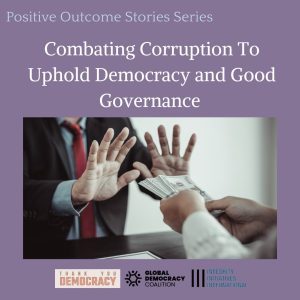Integrity Initiatives International (III): Combating Corruption To Uphold Democracy And Good Governance

Grand corruption is a global problem that undermines citizens’ trust in democracy and institutions. Abuse of public power for personal gain is detrimental to society and empowers autocrats. It siphons off the finance needed to meet the Sustainable Development Goals (SDGs), respond to the climate crisis, and all other manner of global challenges. Several mechanisms including the universal UN Convention against Corruption (UNCAC) are already in place, but there is a need to strengthen the enforcement of criminal laws to hold public officials, bribe payers, and money launderers accountable.
To fill the crucial accountability gap in the global effort to fight corruption, growing coalitions of governments and civil society support the creation of an International Anti-Corruption Court (IACC) to hold accountable corrupt public officials and private enablers when governments are unable or unwilling to enforce the mandatory laws in the UNCAC. Integrity Initiatives International (III) is focused on promoting the IACC by coordinating a diverse range of civil society organizations, experts, and governments. Additionally, III’s Youth Leaders Network (YLN), aims to give voice to and empower youth from around the globe both within the IACC campaign and more broadly. The YLN is a peer to peer learning and support platform where members from Lebanon to Venezuela to Uganda share their success stories and challenges in fighting corruption in their communities and regions. These young leaders actively engage in identifying and addressing corruption and rely on the platform to gather support, raise awareness, and feel empowered as a community.
A growing number of governments, including Canada, Ecuador, the Netherlands, Nigeria, and Moldova have publicly committed to working to create the IACC, while the European Parliament has issued resolutions calling for the court. The UK Labour Party is committed to championing the IACC. The work of Integrity Initiatives International (III) and the Youth Leaders Network (YLN) has significantly contributed to these developments and they continue to promote democracy, transparency, accountability, and good governance, while creating a strong sense of solidarity and community.
